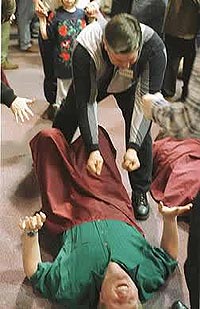Laughter, Swoonings, and Other Strange Things
How should Christians react?
By Dennis Pollock

To some it is an evidence of being filled with the Holy Spirit; to others it is a work of the devil. Still others see it as the product of mental suggestion when combined with gullible, weak-minded people. I am referring to the phenomenon of “laughing in the Spirit” which is sweeping certain American churches these days. Along with phenomena like “being slain in the Spirit,” there seems to be a great controversy arising as to whether or not such things should be going on in the church.
The biggest controversy these days seems to center around laughter. If you have not heard the name of Rodney Howard Brown lately, you must have been hiding yourself away. His teaching and preaching ministry seems fairly normal, except for the dramatic emotional affects that go on in the congregations wherever he ministers. People just can’t seem to stop laughing in his services.
Whatever the source, people are eager to come and be a part of this. He preaches to packed auditoriums wherever he goes. Rodney Howard Brown “wannabes” are beginning to show up in the body of Christ, with laughter as the main event. Some are even declaring laughter to be the new evidence of being filled with the Spirit.
A Personal Experience
Recently I went to one of Rodney Howard Brown’s services in Rockwall, Texas. I had heard so much about him I just had to find out for myself what the excitement was all about. I also wanted to try to discern whether this ministry was legitimate or not.
It wasn’t long after the service began that the laughing phenomenon started. When Rodney called for people to testify about what the Lord had done for them in previous services, a number went forward for that purpose. Yet, when they tried to share, none could really say much as all were nearly rendered incomprehensible by laughing so hard.
Throughout the meeting, whether it was during the offering, the reading of Scripture, or the preaching of a short message, sporadic laughter could be heard throughout the congregation. It was never the entire group. At its height perhaps a third were in laughter. At other times, the percentage dropped to maybe one out of twenty.
An Evaluation
On the positive side, I will have to admit that there was joy in the house of the Lord that day. Rodney’s preaching (which didn’t last more than 25 minutes) was sound, if not spectacular. At the altar call, which preceded the sermon, a relatively good sized group came forward, and were led away to a counseling room.
On the negative side, I found almost nothing said about Christ, redemption, sin, justification, imputed righteousness, eternal judgment, or any of those cardinal doctrines so necessary to Biblical evangelism. Those who came forward at the altar call would have had to have heard about Jesus elsewhere in order to make an informed decision to give their lives to Him.
There simply was not enough said about Jesus at the meeting to have given the slightest notion of who He was and why He came to earth. This meeting could not be truly called evangelism in the Biblical sense. It seemed more a celebration of believers, with entertainment provided by the laughter (either participation in or observing those who were so engaged).
Is It of God?
Was the Holy Spirit involved in this meeting? I think He probably was. However, just because the Holy Spirit may be involved does not mean that everything that goes on is of the Spirit. For one thing, some people can easily allow their emotions to run too far once they feel the presence of the Holy Spirit.
Learning what to do with emotions in church services is a new experience for many Christians. Too many Americans were raised in cold, formal churches where the greatest emotion aroused was a hearty yawn, or a sigh of relief heard once the magical noon hour came and the service was ended.
Today, as we are faced with questions of what is or is not of God, we can take heart that over two hundred years ago, our forefathers in America were dealing with similar questions.
Historical Precedents
How shall we respond to our modern “manifestations” such as laughter? Is it all of God? Of the devil? Or merely psychological? Is it safe to mock it? Shall we seek these things for ourselves? Are those churches that encourage these things to be condemned or commended?
Over two hundred years ago Jonathan Edwards attempted to answer just such questions. He was a key figure in a movement we know today as “The Great Awakening.” This movement of the Spirit served as a powerful impetus to the church. Entire cities were transformed from citadels of blasphemy to havens of righteousness and peace. Yet not all Christians were entirely happy with the movement. Some were concerned about strange manifestations that occurred, such as swooning, “the jerks,” loud outcries, groanings, and the like.
Jonathan Edwards was certainly no flake. Perhaps one of the most intelligent evangelicals America has ever produced, he combined a brilliant mind with a deep love for the Lord Jesus and devotion to the authority of Scripture.
Edwards wrote about a myriad of subjects relating to nearly every facet of Christianity, and took pen in hand to give Christians some guidelines for judging the various manifestations that were occurring in his day. His advice was so sound that it would be profitable for today’s believers to give them heed. Consider the following four quotes by the venerable Mr. Edwards:
“This manner of slighting all religious affections is the way exceedingly to harden the hearts of men, to encourage them in their stupidity and senselessness, to keep them in a state of spiritual death as long as they live, and to bring them at last to death eternal.” (Note: Edwards used the word affections to mean those deep religious feelings and experiences which often led to unusual manifestations such as weeping, laughter, swooning, etc.)
Edwards was convinced that when the Holy Spirit was mightily at work, people would come to have deep feelings about their sins, about Christ, and their need for salvation, and that it would be wrong to suppress all such feelings and not allow any room for the manifestations that they might cause. He felt that genuine Christianity did, at times, produce powerful emotions. His sermon, “Sinners in the Hands of an Angry God,” would certainly be a good example of this. In this sermon, while Edwards preached on the perilous condition of the sinner, the anxious listeners would begin to cry out and clutch at the pews for fear that the floor underneath them would open up, and they would slide into hell.
“There are many false spirits, exceeding busy with men, who often transform themselves into angels of light, and in many… ways, with great subtlety and power, mimic the operations of the Spirit of God.”
Edwards recognized that God’s Spirit was not the only means of producing various bodily manifestations; Satan and his demonic cohorts were quite capable of imitating the Spirit’s work and creating distracting manifestations which serve to hinder the work of God and take people’s eyes off the Lord Jesus.
David Berg, founder of the immoral and occultic group, The Children of God, described how he received something he had strongly desired — the gift of tongues: “I was lying there between Martha and Maria [his illicit “wives”] praying like a house afire, and all of a sudden before I even knew what happened I was praying in tongues… It was probably Abrahim [his spirit guide he had picked up at a Gypsy camp]… praying through me in the Spirit.” The fruits of Berg’s lifestyle and the movement he spawned make it clear that this was not a gift of the Holy Spirit.
I am not suggesting that all speaking in tongues is of the devil; I believe that there is a legitimate gift of tongues, as described by Paul in 1 Corinthians 12. However not all that glitters is gold, and not every experience that is supernatural is by the Holy Spirit. There are many unclean spirits flitting through the air who are only too happy to oblige those who want spiritual experiences without the inconvenience of making Jesus Christ the Lord of their life.
“The weakness of human nature has always appeared in times of great revival of religion, by a disposition to run to extremes, and get into confusion; and especially in these three things: enthusiasm, superstition, and intemperate zeal.”
Many suppose that in times of revival all will be perfectly orderly, no one will get in the flesh, the devil will have absolutely no place in anything that ever happens, and it will not be necessary to have to distinguish between what is of God and what is of the devil. The truth is that even in those times of great revival and outpouring of the Holy Spirit, fanatical and fleshly things can and often do happen. Satan does not just pack up his toys and go home once God begins to move. He sneaks around the camp, looking for entryways to mix his works in with God’s.
“It would be very unreasonable, and prejudicial to the interest of religion, to frown upon all these extraordinary external effects and manifestations of great religious affections. A measure of them is natural, necessary, and beautiful… Yet I think they greatly err who suppose that these things should be wholly unlimited, and that all should be encouraged in going to the utmost length that they feel inclined to… There ought to be a general restraint…”
Here, I think, is the word of balance that the Church needs to hear today. For us to sternly disapprove of everything and anything the least bit unusual or emotional in the Church would be not only unwise, but could end up putting us at odds with and grieving the Holy Spirit.
I, for one, have no desire to criticize and ridicule every unusual or emotional reaction that I hear of. The last thing I would want to find out when I get to Heaven is that I had been mocking the work of the blessed Holy Spirit.
On the other hand, it is naive and equally unwise to suppose that church leaders ought to allow any and every emotional outburst that unstable people care to produce.
Charles Wesley found it necessary to deal with emotional frenzies he called “the fits”. Here’s what he had to say about a couple of such experiences: “Many, no doubt, were, at our first preaching, struck down, both body and soul, into the depth of distress. Their outward affections were easy to be imitated…”
Today one was pleased to fall into a fit for my entertainment, and beat himself heartily. I thought it a pity to hinder him so left him to recover at his leisure. Another girl, as she began to cry, I ordered to be carried out. Her convulsion was so violent as to take away the use of her limbs, till they laid and left her outside the door. Then immediately she found her legs and walked off.
As we struggle in trying to decide what is of God and what is not, let us take courage in knowing that we are not the first to face this issue. Wherever the Spirit of God is moving, powerful emotions may be stirred and we can be sure that Satan will come in and try to discredit the work by fanaticism.
Let’s keep in mind the words of John Wesley who once prayed: “Lord send us revival without the wildfire, but if it cannot come without wildfire, then let the wildfire come too, but by all means, send us revival!” Amen!




